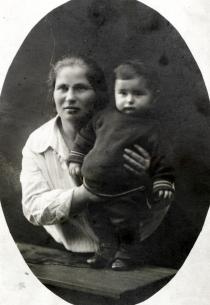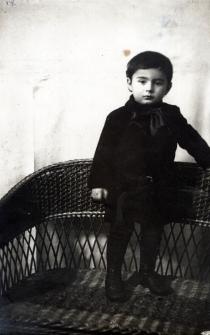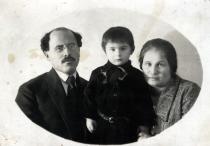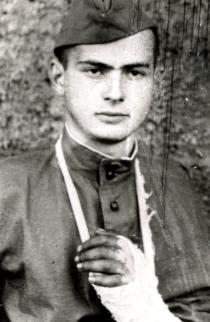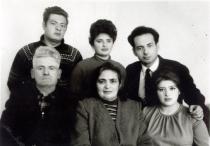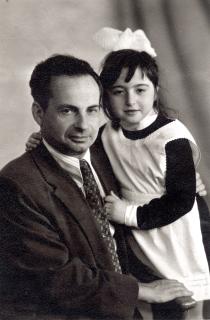This is a photo of my wife's family, taken in Sargorod in 1968. From left to right in the lower row are my father-in-law, Naum Aizman, my mother-in-law, Sarah Aizman and my wife Alexandra Tulchinskaya [nee Aizman]. From left to right in the upper row are my brother-in-law, Dmitriy Aizman, my sister-in-law, Dora Aizman, and me.
I met my future wife, a Jew, in 1967. My wife was born in 1946. She was 22 years younger than me. She finished a Ukrainian secondary school and a pharmaceutics school in Shargorod and came to Kiev to enter Medical College. She rented an apartment from my Aunt Liza. My cousin, Zina, decided to introduce us to each other. We had a civil wedding ceremony in 1966.
Her father was born in the town of Gusyatin, on the western border of Ukraine, in 1899, I think. Her father had an elementary education. He probably studied at cheder. Before the war my wife's father was chairman of a shop in Gusyatin. My wife's mother, Sarah, was born in 1915. She finished a Ukrainian elementary school. She didn't have any profession. She married Naum Aizman in 1935 and became a housewife. My wife's parents didn't celebrate any Jewish holidays or observe any traditions. After the beginning of the war their family evacuated to Middle Asia. My in-laws' children died from dysentery and pneumonia. The food and water were very poor and the conditions of living very hard in the place where they lived. Many children died of infections and lack of food.
After the war my father-in-law went to Shargorod, located close to his hometown. There's a synagogue, a church and a cathedral in Shargorod. This town had Jewish, Polish and Ukrainian inhabitants and people lived in peace with each other. They spoke Yiddish and Ukrainian in Shargorod. During the war there was a big ghetto there. The majority of Jews were exterminated, and the ones that survived left for other places after the war. There are hardly any Jews left in Shargorod today.
My father-in-law became a soda water and lemonade expert in Shargorod after the war. He created his own recipes and made syrups. The local authorities allowed him to open a store in Shargorod. Although it was a state-owned store he had his own customers and could provide well for his family. His products were in big demand and he earned well.
My wife's brother Dmitriy finished the Road Transport College and was a driving teacher at a technical school in Shargorod. Dmitriy married a local girl named Anna. They had a big wedding party, but I don't remember whether theytraditional Jewish wedding. He was a member of the Communist Party. They had two children. They led a quiet life, didn't have any hobbies, didn't celebrate any Jewish holidays or observe traditions. In the 1980s they went through hard times when the Soviet regime was collapsing. Dmitriy found a profitable business. He took a course and learned how to make smoked fish. He opened a smoking shed and became a fish supplier. He died when he was 54. His older son, Alexandr, his wife and her parents emigrated to Germany in 1996. Anna also moved there after Dmitriy died. Anna's younger son, Igor, became very religious. He grew a beard. Nothing of this kind had ever happened in our family before. In 1999 he was in a camp in Israel. He received a student's visa to the USA and went there to study to become a rabbi. I don't know whether he finished his studies or not, but he stayed in the USA. His religiosity came to him somehow even though his mother Anna had never been serious about religious issues.
My wife's sister Dora was born deaf and dumb. She studied at the boarding school for deaf and dumb children and became a tailor. She worked at a tailor's in Shargorod. Dora married a deaf and dumb man from a neighboring town in 1970. Her husband was a good carpenter, cabinetmaker and welder. He worked at a construction company for some time. They didn't observe any traditions or celebrate holidays in Dora's family. I think the reason was that none of our families ever had any celebrations. Dora's eyesight got so bad that she became almost blind. In the 1990s perestroika began, and her husband lost his job. Dora couldn't earn anything, they had five children and were literally starving. Their family moved to Israel in 1996. They still live there now, but we aren't in touch with them.

